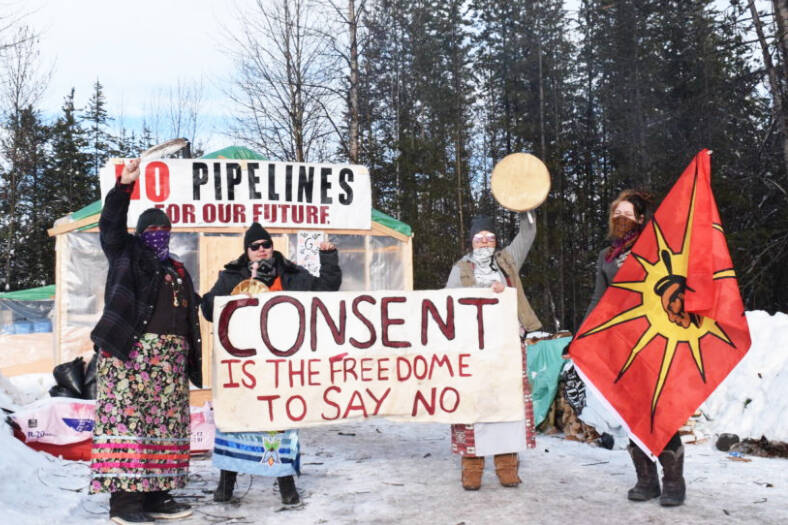A Coastal GasLink (CGL) work site south of Houston has once again become the centre of a standoff between the company and police and Wet’suwet’en and other opponents of the pipeline project who blockaded access to the site late last week.
Videos posted on the Unistot’en Camp Facebook page earlier this week show RCMP members attempting to remove an individual from under a school bus blocking the Pimpernel Forest 2 Service Road using what the officers called “pain compliance” techniques.
In an emailed statement, RCMP confirmed two individuals had been arrested in compliance with a B.C. Supreme Court injunction obtained by CGL last year.
“Houston RCMP were called in for a report that protesters had blocked access to a CGL pipeline site on the Pimpernel Forest 2 Service Road near Houston, B.C on Sept. 20,” wrote RCMP spokesperson Cpl. Madonna Saunderson. “Efforts have been ongoing to negotiate with the group to leave the area and allow CGL employees to continue with their work.
“Two individuals have since been arrested; one on Sept. 26 for breach of the injunction and criminal code charges of obstruction and assaulting a police officer, and the other person was arrested on Sept. 27 for breach of the injunction.”
In a press release Sept. 30, the Unistot’en Camp condemned the arrests as “torturous” and unlawful.
“On the National Day of Truth and Reconciliation, reconciliation is dead,” said Sleydo’ (Molly Wickham), Gidimt’en Checkpoint spokesperson. “The government, industry, and police are still invading our yintah. The authority of the Wet’suwet’en hereditary house and clan system was verified in the historic Delgamuukw and Red Top court decisions, but our hereditary system continues to be disrespected by B.C. and Canada.”
Protests last year against the pipeline where it crosses the territories of several Wet’suwet’en clans set off rail blockades across the country.
CGL workers are preparing to run the pipeline underneath the Morice River, something Wet’suwet’en and others are protesting, saying there will be environmental and cultural harm.
“They are trying to drill under the Wedzin Kwa River, the sacred headwaters that feeds all of Wet’suwet’en territory and gives life to our nation,” the press release stated, also alleging cultural destruction.
“Days ago, CGL destroyed our ancient village and cultural heritage site, Ts’elkay Kwe. We refuse to allow this destruction to continue and are now blockading CGL. Our Chiefs – not CGL or Canada – have full jurisdiction on our yintah.”
The company disputes the negative environmental impact of the work.
“Micro-tunnelling was determined to be the safest and most environmentally responsible method after thorough expert assessments, regulatory requirements and best practices,” wrote CGL president Tracy Robinson in a statement.
“This is the most precise drilling method for this crossing and utilizes state-of-the-art technology.”
An open letter from more than two dozen archaeologists addressed to the B.C. Archeology Branch also criticized the Coastal GasLink work, saying the company and the B.C. government failed to properly consult the Wet’suwet’en and could lead to the destruction of Indigenous artifacts.
CGL parent TC Energy, which owns the project, disputed the accusations in a statement, saying it had engaged with the Office of the Wet’suwet’en and had unearthed and saved artifacts under the supervision of a trained archaeologist.
Provincial Indigenous relations minister Murray Rankin said the pipeline project has been approved by elected Indigenous leaders and the provincial government is working with hereditary chiefs to come to an agreement about rights and titles.
The 670-kilometre Coastal GasLink pipeline was approved by both the province and all 20 elected First Nations councils along its path to transport natural gas from northeastern B.C. to a processing and export facility on the coast in Kitimat.
However, some Wet’suwet’en hereditary chiefs claim the project has no authority without consent through their traditional system of governance.
The open letter signed by 25 archeology professionals and academics from Canada and the U.S. says the work and alleged damage at the Lamprey Creek site could have a large effect on future studies and consultation with the Indigenous groups would have shown that.
“You would have realized that the destruction of archaeological resources — non-renewable resources – … will result in the erasure of much of the context associated with Ts’elkay Kwe Ceek cultural landscape,” the letter said of the traditional name for the territory where the work is being done.
TC Energy’s statement said it is has worked with Indigenous communities and representatives to ensure work can be done safely.
“Coastal GasLink has engaged with Indigenous communities, to ensure open and constructive dialogue to protect Indigenous values and cultural heritage,” the company said.
(With files from Canadian Press/Nick Wells and Thom Barker)

